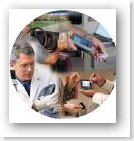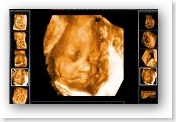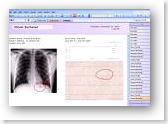This is something I have been wanting to write about for a while and today's the day to finally express a couple of my own opinions about some gray areas and technology in healthcare.
 Healthcare as we know today is so terribly fragmented and there is nobody feeling the squeeze worse than the software companies and developers trying to produce a quality and up to date product. With the changes emerging so rapidly in healthcare, almost daily, it is becoming increasingly difficult to create a full featured software application that is not outdated before it is released.
Healthcare as we know today is so terribly fragmented and there is nobody feeling the squeeze worse than the software companies and developers trying to produce a quality and up to date product. With the changes emerging so rapidly in healthcare, almost daily, it is becoming increasingly difficult to create a full featured software application that is not outdated before it is released.
So what are some of the issues that are making this process somewhat difficult and trying at times...one issue is the emerging area of Software as a Service. A while back we learned that we needed to include potential interactions when prescribing medications...and to do this in real  time, desktop software had to take advantage of web based products to integrate the most recent updated data bases. This could not adequately come from desktop software as the changes and modifications are almost daily, thus electronic medical records evolved from just a desktop to integrating this information in to real time prescribing. We also had the integration of lab services for patients. Again, this also involved a web interaction to import and react with up to the minute chart and patient information and bring it all in to the chart.
time, desktop software had to take advantage of web based products to integrate the most recent updated data bases. This could not adequately come from desktop software as the changes and modifications are almost daily, thus electronic medical records evolved from just a desktop to integrating this information in to real time prescribing. We also had the integration of lab services for patients. Again, this also involved a web interaction to import and react with up to the minute chart and patient information and bring it all in to the chart.
One more the scenario is evolving and what I would call a much bigger transition. Enter the era of personalized medicine. One lab already has over 1,000 tests available that relate to genetics, and it's growing at a rapid pace. Genetics and their use is growing at such a rapid pace, it is a scramble to determine the next step. It also goes beyond medical records and touches on reimbursement areas as well.
 As the area of genetics continues to grow with medications prescribed based on our DNA, this is the next big hurdle to integrate into the medical chart. In other words the whole way of practicing medicine is evolving daily as is the information needed by your physician. Electronic Medical Records developers are aware of this change and are working diligently to bring this in to the fold as it evolves, it is almost similar to trying to shoot a moving target without a site to locate. Will we be charting DNA soon...probably...your DNA to match with pharmaceutical solutions.
As the area of genetics continues to grow with medications prescribed based on our DNA, this is the next big hurdle to integrate into the medical chart. In other words the whole way of practicing medicine is evolving daily as is the information needed by your physician. Electronic Medical Records developers are aware of this change and are working diligently to bring this in to the fold as it evolves, it is almost similar to trying to shoot a moving target without a site to locate. Will we be charting DNA soon...probably...your DNA to match with pharmaceutical solutions.
There is also a shortage of education on the issues as again it is moving at such a rapid pace. Bear with your EMR vendor to work with you. Larger hospital software applications are probably the first to address and work in this area, but it also needs to be at the physician's level at the office and there is the challenge. How do we incorporate all this information into a solid solution that allows the physician to access and mine all the data needed to make a clinical decision in the 10 minutes or so he/she is spending with a patient...a challenge...you bet it is.
Now enters what is called the User Interface...with new technologies such as Silverlight and Windows 2008 Server from Microsoft as a couple examples, we now have the power and code to dig deep and with a user friendly interface for the end users, to also include  personal health records from the patient side of things. This area is growing rapidly and EMR Vendors are very much aware and have programmers and others working diligently to bring this to fruition as well.
personal health records from the patient side of things. This area is growing rapidly and EMR Vendors are very much aware and have programmers and others working diligently to bring this to fruition as well.
Now that we have the software and genetics going, now we need to explore what type of hardware do we need...software integrators can help ease the situation a bit, but again overall it comes back to the EMR Vendor/Developer to best serve the interest of the end user and either incorporate this in to a solution or be ready and available to recommend the  hardware that will be required to sustain the medical records system...being client/server, totally web based, or a combination there of. Will this be a total server application with assistance from someone like Citrix, will it be a Windows Terminal Services Operation...many choices...and what hardware will work both for a desktop
hardware that will be required to sustain the medical records system...being client/server, totally web based, or a combination there of. Will this be a total server application with assistance from someone like Citrix, will it be a Windows Terminal Services Operation...many choices...and what hardware will work both for a desktop  scenario as well as mobile solutions...and the EMR Vendors will more than likely want to have some hardware certification to give their clients as nobody needs a good software system with hardware that is either outdated or just not the right choice for the job. This takes time for the vendor to obtain and process as you do want hardware that is powerful and mobility capable to handle the job, especially with mobility as tablets and other mobile units come in all shapes and sizes.
scenario as well as mobile solutions...and the EMR Vendors will more than likely want to have some hardware certification to give their clients as nobody needs a good software system with hardware that is either outdated or just not the right choice for the job. This takes time for the vendor to obtain and process as you do want hardware that is powerful and mobility capable to handle the job, especially with mobility as tablets and other mobile units come in all shapes and sizes.
The medical records business has also grown to working with imaging...now we want  medical imaging in the chart, not just text as was the case a few years ago...this means more infrastructure support and software modifications, again getting back to having the real time information available for the physician consulting with the patient in the office. The ambulatory software used in a physician's practice must now also communicate with the systems used at the hospitals and all vendors are working towards the same goals on both sides of the coin.
medical imaging in the chart, not just text as was the case a few years ago...this means more infrastructure support and software modifications, again getting back to having the real time information available for the physician consulting with the patient in the office. The ambulatory software used in a physician's practice must now also communicate with the systems used at the hospitals and all vendors are working towards the same goals on both sides of the coin.
There is also the CCHIT certification process...and I can't help but think this is getting more complicated as time moves forward....what is being certified and how will the EMR Vendors handle the hurdles of the ever growing goals to be met, will the goals be changing as rapidly as the state for EMR Medical Records...I might guess there will be some shifting in this area as time goes on...
 In summary, be patient, communicate, offer suggestions and feedback to your EMR Vendor...it's not an easy task these days and the lines are not always black and white. There's a ton of money that goes out for research and development with electronic medical records, a daily process, and it will continue to change and evolve. One other item to mention is the bottom line for payment in all of
In summary, be patient, communicate, offer suggestions and feedback to your EMR Vendor...it's not an easy task these days and the lines are not always black and white. There's a ton of money that goes out for research and development with electronic medical records, a daily process, and it will continue to change and evolve. One other item to mention is the bottom line for payment in all of  this...most vendors are working to keep the cost as affordable as possible..and they do in fact simply "eat" much of the cost if you were to "line item" evaluate the entire process. The EMR Vendor too also has to recover some profit to maintain and stay in business to continue to provide support and help for the system...support contracts are not a bad thing by any means, but more or less a good thing to consider as we all work towards the same goal of better documented and overall health care for all - saving lives 101. BD
this...most vendors are working to keep the cost as affordable as possible..and they do in fact simply "eat" much of the cost if you were to "line item" evaluate the entire process. The EMR Vendor too also has to recover some profit to maintain and stay in business to continue to provide support and help for the system...support contracts are not a bad thing by any means, but more or less a good thing to consider as we all work towards the same goal of better documented and overall health care for all - saving lives 101. BD



I think you hit the nail on the head here. I have been reading about this on the web and most people don't know about how genetics are going to affect us. My doctor started telling me a little about how it will work and I still don't quite understand all of it. There's a lot of stuff that has to come together.
ReplyDelete